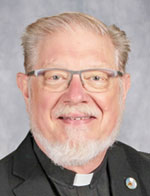That All May Be One / Fr. Rick Ginther
Following our call as Catholics to a dialogue of life with humanity
 “[We need to take up] seeing and feeling with God.”
“[We need to take up] seeing and feeling with God.”
What a startling sentence—to see and feel with God!
I heard this a couple of weeks ago at a symposium titled “Deepening Communion in a Polarized World.” Hundreds of folks—clergy, lay and seminarians—were invited to ponder it.
And make it their own.
The gathering was co-sponsored by Saint Meinrad Seminary and School of Theology and Glenmary Home Missions. The ultimate goal of the two-day gathering at Saint Meinrad was to awaken in the participants a personal conversion toward a life of communion (oneness and unity) within themselves, to serve the Church and the world.
Father Aaron Wessman, a Glenmary missioner and author of the book The Church’s Mission in a Polarized World, set the stage for the entire symposium.
It was he who voiced the above sentence.
The words were based on a passage from Pope Benedict XVI’s 2007 apostolic exhortation “Sacramentum Caritatis” regarding Christ’s words, “The bread I will give is my flesh, for the life of the world” (Jn 6:51):
In these words, the Lord reveals the true meaning of the gift of his life for all people. These words also reveal his deep compassion for every man and woman.
The Gospels frequently speak of Jesus’ feelings toward others, especially the suffering and sinners. Through a profoundly human sensibility he expresses God’s saving will for all people—that they may have true life.
Each celebration of the Eucharist makes sacramentally present the gift that the crucified Lord made of his life, for us and for the whole world. In the Eucharist, Jesus also makes us witnesses of God’s compassion toward all our brothers and sisters.
The eucharistic mystery thus gives rise to a service of charity toward neighbor, which consists in the very fact that, in God and with God, I love even the person whom I do not like or even know.
This can only take place on the basis of an intimate encounter with God, an encounter which has become a communion of will, affecting even my feelings. Then I learn to look on this other person not simply with my eyes and my feelings, but from the perspective of Jesus Christ. (“Sacramentum Caritatis,” #88)
“… Seeing and feeling with God.” Rooted in love (for God is love), this leads to respect for the other and a willingness to encounter the other in relationship.
It is much more—much, much more—than tolerance. It is joining one’s eyes and feelings with God’s as revealed by Jesus, the Christ.
As Pope Benedict notes, such a joining requires knowing how God sees and feels toward humanity. To do that, we must daily encounter God in the Gospels. To bring that encounter to full intimacy, we need the celebration and sharing of the very fullness of Christ in Eucharist.
We as Catholic Christians are called to a dialogue of life with humanity. That dialogue encompasses ecumenical and interreligious relationships, for sure.
But that dialogue encompasses any encounter with other human beings: friend, acquaintance, colleague, immigrant, refugee, toddler, teenager, senior, prisoner, homeless, beggar, gay, queer, enemy, and on and on.
The urgings of Pope Benedict are echoed in each pontiff since Pope St. John XXIII. Pope St. John Paul II repeatedly proclaimed the dignity of every person. Pope Francis made them a hallmark of his pontificate. And Pope Leo XIV has clearly embraced them as well.
The words are telling. Will they change our hearts into a way of life?
(Father Rick Ginther is director of the archdiocesan Office of Ecumenism and Interreligious Affairs. He is retired from full-time pastoral ministry, but is still active as a priest of the archdiocese.) †
 “[We need to take up] seeing and feeling with God.”
“[We need to take up] seeing and feeling with God.”